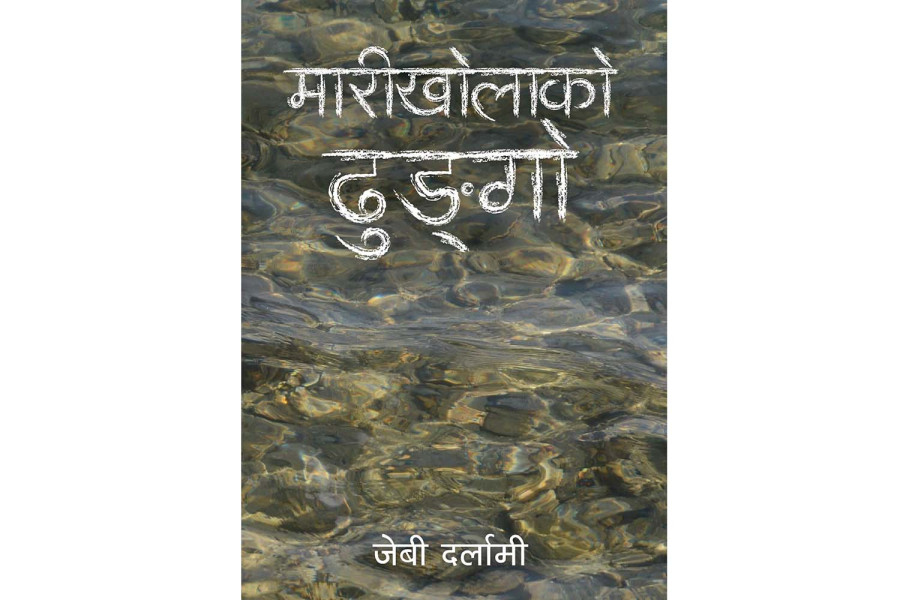Books
A tale of vengeance and loss
‘Marikholako Dhungo’ by JB Darlami follows the story of a soldier whose life is shaped by the brutal realities of civil war.
Timila Maharjan
‘Marikholako Dhungo’ by JB Darlami is a novel rooted in the author’s experiences and observations of the Nepali civil war. Serving as a powerful testament to the horrors of war that engulfed the nation, the book delves into the story of Balidan Rokamagar, a Maoist soldier. Through his journey, the novel portrays the devastating events that shaped that era (1996 to 2006).
While fictional in its narrative, it is inspired by actual events.
The novel follows the story of Man Bahadur (real name Balidan Rokamagar), a Maoist soldier shaped by tragedy. After the Nepal Army brutally killed his entire family—his mother, father, and sister—Man Bahadur is propelled by grief and a burning desire for vengeance. Despite being raised with the belief that violence is never the answer, the devastation forces him to abandon those ideals and take up arms.
Initially, his sole focus is to avenge his family, but as he delves deeper into the Maoist movement, he encounters countless others who have suffered similar losses. Fueled by collective anger and a thirst for justice, his grudge transforms into a broader mission to eliminate those responsible for widespread atrocities.
The book captures the mental toll of war on those living through its chaos. The author describes the pervasive despair, remarking, “Days of war also felt like nights,” a metaphor for the relentless gloom and hopelessness that engulfed everyday life. Uncertainty loomed over the future, and no one’s life was guaranteed. Amid this turmoil, the general public was trapped between two forces—the Maoists and the Nepal Army—both of whom posed a constant threat. Civilians lived in perpetual fear, vulnerable to the atrocities committed by either side, highlighting the devastating impact of war on ordinary lives.
Balidan Roka Magar, operating under the name Man Bahadur Budha, arrives in the Sandhikharka village of Argakhachi disguised as a labourer. He is sent to prepare for the attack in the army headquarters. Tasked by his party to uncover sensitive information, he gathers the necessary details, laying the groundwork for the operation.
At the novel's start, the protagonist’s identity as a Maoist soldier remains concealed, creating a gripping twist when the truth is revealed midway through the narrative. While working undercover, he encounters numerous individuals who extend their kindness despite their hardships. Among them are Muskan Bahadur Nepali (Musey) and Bal Bahadur Somai Magar (Palpali), who assist him in securing a job as a daily labourer and share their modest shelter in a park for a few days. Their selfless gestures reflect humanity's resilience during adversity and offer him a glimpse into the widespread suffering and despair the war has inflicted upon ordinary Nepali citizens.
On his first day as a daily labourer, he encounters Mira Bhusal, who offers him shelter in her home. As he spends more time there, he discovers that Mira's brother was a member of the Nepal Army, and tragically, he was killed by the Maoists. In a painful twist of fate, the man responsible for his death is none other than Man Bahadur himself, who had executed the killing while acting under orders during a hostage situation. This revelation plunges Man Bahadur into a deep internal conflict as he struggles with the weight of his actions.
Despite his initial intentions to follow orders rather than kill, the guilt over his role in another's death eats away at him. The novel intertwines unexpected plot developments that keep readers on edge while offering a raw and realistic portrayal of the war's toll on the human psyche and society. It’s a stark reminder that war’s consequences go beyond physical deaths; it destroys families, disrupts communities, and leaves lasting emotional scars. The pervasive fear instilled in the people is palpable, highlighting the cost of war on both a personal and collective level.
The novel also explores the bond between Mira and Man Bahadur, which transcends blood relations. Mira treats him like her brother, seeing the reflection of her lost sibling in him. However, there are moments when this relationship feels somewhat unrealistic, especially when Mira's affection for Man Bahadur remains unwavering, even after learning the truth about his identity as a Maoist soldier.
Despite the betrayal, her love for him does not falter. One such instance occurs when Man Bahadur, after a Maoist attack on the Nepal Army in their village, abruptly leaves without a word. Years later, when the war ends, he returns as a Maoist soldier. During a protest, he sees Mira but ignores her. Later, he visits her at her home as if nothing has changed. His behaviour feels disjointed, considering the complex emotions that should have been at play. His actions, coupled with Mira's continued acceptance of him, don’t quite align with the gravity of their situation.
Man Bahadur’s time in the army barracks, where he forms a close bond with Bir Bahadur Magar, his enemy, adds complexity to his character. As a Maoist soldier, he lives in the home of a family whose son he killed, becoming friends with the very army he fought against. His conflicting feelings—grateful for the kindness of those who helped him, yet part of a group instilling fear and violence in innocent people—create a sense of hypocrisy. Although he joined the Maoists with good intentions, he still participated in the war.
After the peace agreement was signed, the Maoist army reached the cantonment. From there, Man Bahadur's life takes a new turn. The fighters laid down their weapons and entered the cantonment, ready for a new revolution. However, he finds out that the leadership has a different purpose. New people enter the camp daily. While the war was going on, those trying to eliminate the Maoists were now on their way to becoming party leaders. People who hated hearing the word Maoist were being established in the party. Man Bahadur was found ineligible for the cantonment. Losing a finger in the war was enough to make him ineligible.
After leaving the cantonment, Man Bahadur returns to his village in Rolpa, only to be met with shame and questions about the war he fought. The community blames him for the government’s failures and the hardships caused by the conflict. Struggling to make ends meet and frustrated by the lack of opportunities, he seeks work in Saudi Arabia. However, after realising he’s been deceived by his employer, he illegally switches to another company and works as a security guard. While there, he falls ill but is unable to seek proper medical treatment due to his lack of documentation. In the end, he dies in Saudi Arabia, but his body cannot be repatriated to Nepal. Despite Mira’s relentless efforts, bureaucratic hurdles prevent his return, underscoring the harsh realities faced by migrant workers living in the shadows.
Man Bahadur’s story is a reflection of the countless Maoist soldiers who, like him, were discarded by the government after their sacrifices. It portrays the insurgency period's disillusionment, questioning the decade-long war's outcome. In the end, the war yielded nothing for many, like Man Bahadur. Their lives were shattered, yet the promises of change remained unfulfilled. It’s a tragic tale of a soldier who, once filled with hope to bring justice and a better future to Nepal, is lost and forgotten—both in foreign lands and his own country.
Man Bahadur, much like his code name ‘Alapatra,’ became an outcast, discarded by both sides—abandoned by the country he fought for and left to fend for himself in a foreign land.
The book also critiques the hypocrisy of the political leaders who, once promising a better future for all, fell prey to corruption and power struggles. The injustices they once fought against are now the systems they perpetuate, mocking the ideals they claimed to uphold.
Marikholako Dhungo
Author: JB Darlami
Year: 2024
Publisher: Publication Nepalaya
Pages: 134




 8.26°C Kathmandu
8.26°C Kathmandu










